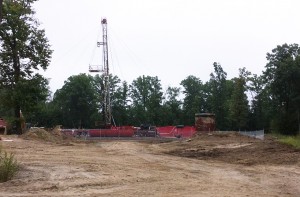MEC supports bill for local control of oil and gas

Imagine a football field. Now imagine that your house is in one end zone, and just past the other end zone is a fence. Behind this fence is a drilling rig operated by a company trying to find oil and gas. At this distance, the rig is allowed to operate at 70 decibels, even overnight, which is the equivalent noise level of a vacuum cleaner. Unless you are in Oakland, Macomb, or Wayne County, lights from the drilling rig can shine through your windows all night, every night.
This was the new reality citizens of Shelby Township woke up to recently when drilling rigs came to town. This mainly suburban, residential community of more than 73,000 people is one of the newest targets for oil and gas exploration in Michigan. Smaller but similarly situated Scio Township, near Ann Arbor, was also a target for exploration.
Legislative efforts last term to address concerns about residential drilling failed in the rush of the lame duck session, but the issue has resurfaced in the House. The Michigan Environmental Council is in support of new legislation introduced last week by Rep. Peter Lucido, a Shelby Township Republican, that would allow for greater local control over oil and gas activity.
Despite the fact that these townships are larger in population than many cities—Shelby Township is the 17th-largest municipality in the state by population—they have no authority under the Michigan Zoning Enabling Act (MZEA) to regulate drilling for oil and gas in any way. Though cities and even villages are allowed to zone for oil production, counties and townships are explicitly barred from doing so in the MZEA.
Some of the townships affected have passed moratoriums and are attempting to use nuisance powers to curtail some of the issues created by the drilling. Great Lakes policy group FLOW has outlined what municipalities can do in that regard. However, without the ability to properly zone and address the use of land this close to highly populated residential areas, these townships lack a crucial tool to address the health, safety and well being of their citizens. Township officials have also spoken publicly supporting the giving this zoning authority back to townships and counties.
Rep. Lucido’s new legislation, House Bill 4237, removes from the MZEA language barring counties and townships from zoning for oil and gas drilling. Following his bill, Citizens for Oil Free Backyards put out an issue paper for legislators and other interested parties to make sure all are informed about this issue.
Ultimately, this is an issue of local control and governance for the health and safety of residents and the environment. Despite claims by the oil and gas industry, limiting drilling in residential areas will have minimal impact on economic development in Michigan. Advances in drilling technology make it possible to access potential oil and gas deposits from a distance, without putting wells in people’s backyards.
MEC supports giving local residents and governments more authority over oil and gas activity in their communities, and we support Rep. Lucido’s inclusive proposal in HB 4237 to give this authority back to all townships. If you are affiliated with an organization that wants to get involved in this issue please contact Sean Hammond at (517) 999-0422 or [email protected].
Editor’s note: Author Sean Hammond is MEC’s new Deputy Policy Director. Read more about Sean here.
###
Photo courtesy Citizens Against Residential Drilling.
Comments are closed.



Nice piece; although Part 615 does reserve regulatory authority for the DEQ over many aspects of oil & natural gas development, Townships do have a number of ways to exercise both police power and zoning authority over the effects of fracking and its ancillary activities, facilites, and uses. Please see this article from last summer’s Bar Journal: http://www.michbar.org/journal/pdf/pdf4article2392.pdf
The legislative proposal you discuss would certainly be helpful for local governments, and would bring a great deal more clarity to this issue, but it is important to recognize that there *is* existing authority (although it is admittedly limited primarily to the ancillary activities and effects, rather than the drilling itself) within those local governments by virtue of their police power and zoning authority.
Now it’s time for a bill that would allow for local zoning to regulate mining.
Thanks for this article; I just wanted to echo’s Ross’ point that while Part 615 preempts local government control over oil and gas wells themselves, townships and counties do have zoning and police power authority to regulate ancillary activities, such as nuisance issues (light, air emissions, hours of operation, noise), infrastructure/road concerns, certain pipelines etc. For more info on local legal strategies and authority, please review FLOW’s report at: http://flowforwater.org/wp-content/uploads/2013/04/Final-Report-Fracking-Local-Township-Ordinance-Project.pdf
Hello: As noted by Ross and Liz, many of the disturbing aspects of drilling can be regulated by the local community. These include hours of operation (typically can’t start operating until 8 am), allowable hours for heavy trucks, lighting (no bright lights past a certain hour), etc. Check with the local community since many of these ordinances already exist. All of this means there are ways that we can make industry and the community operate together for the common good.